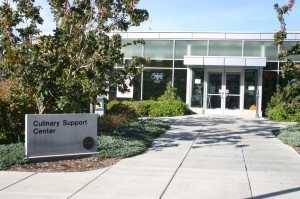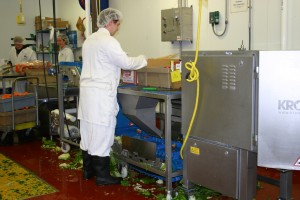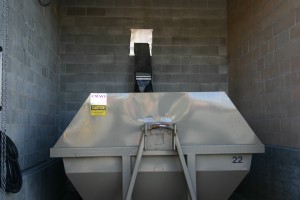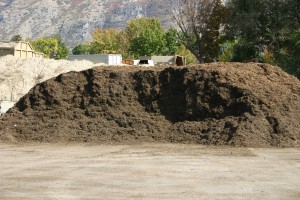
Food is prepared for distribution at the Culinary Support Center. (Hannah McCulloch)
BYU generated over 5,000 tons of waste last year.
According to BYU’s solid waste supervisor Bill Rudy, last year’s waste consisted of unmeasured amounts of food waste, plus 4,008 tons of garbage, 2,135 tons of compost, 445 tons of cardboard, 300 tons of mixed paper, 210 tons of press paper, 90 tons of newspaper, 16 tons of plastic bottles and two tons of aluminum cans.
BYU is conscious of ways to reduce and reuse the amount of waste it processes each year. BYU Dining Services specifically focuses on minimizing packaging by working directly with the purchasing department to contract with local farmers.
Twenty-seven percent of the foods used on campus are from local businesses, according to Director of Dining Services Dean Wright. BYU purchases its dairy, eggs, beef and cereals from local farmers.
Produce is cleaned, sliced, diced and shredded to prepare over 30,000 meals daily at BYU. The food is then distributed to roughly 20 locations that provide food for the BYU community.
“There is no simple answer when you are feeding up to 30,000 meals a day. There is no simple answer on how to be the best and work with the environment. However, part of BYU Dining Services’ vision statement is sustainability, and we are very conscious of what we do with food and with food waste,” Wright said.

Food waste generated in the preparation and consumption processes is organized into trash and scraps. The trash is taken to a compactor and food scraps are fed to a pulper, similar to a giant disposal.
The food waste is combined in a large dumpster and taken to an off-site location. There it is combined with grounds waste and composted until it is ready for use as a nutrient-filled topsoil for campus.
Wright said the university is very mindful of the importance of recycling.
“We are one of the largest universities as far as capturing our waste products and recycling and reusing them as grounds material goes,” Wright said.
A patient process is required to recycle campus waste and create top-notch topsoil for BYU. Organized piles of organic and inorganic materials are created when waste is delivered to the recycling ground.
The organic materials undergo several months of transformation before being combined with inorganic matter. Leaves, wood, grass, sawdust and branches are broken down and regularly sent to Mapleton to compost in six-feet-high rows.

As organisms break down the piles, heat is generated. The most effective temperature for a composting pile is around 130 degrees Fahrenheit.
The temperature of these piles is easily affected by water content, as explained by Rudy.
“If a pile dries out, the temperature comes down. If it is too wet, it stinks, and the temperature also comes down. When it has decomposed enough, the temperature drops down too,” Rudy said.
Long probes are used to measure the interior temperature of the piles to aid in temperature regulation. Sprinkler systems keep the piles damp and machines in turning the piles to help waste decompose at a similar rate.

Composted material is brought back to BYU’s recycling grounds after several months and mixed with inorganic materials such as silt, sand and clay, and tested until it has reached a healthy balance.
“The soil undergoes tests that measure how well inorganics balance with organics, allowing water to seep in, but not so much that that the water can’t make it through the soil and won’t hold the nutrients,” Rudy said.
The soil is distributed to campus once it has completed this balancing process. This process is continual as more waste is created daily, and BYU continues to make an effort to recycle and reuse.
“At BYU our philosophy is not to tell the world how great we are or all that we do. We do it because it is the right thing to do,” Wright said.




